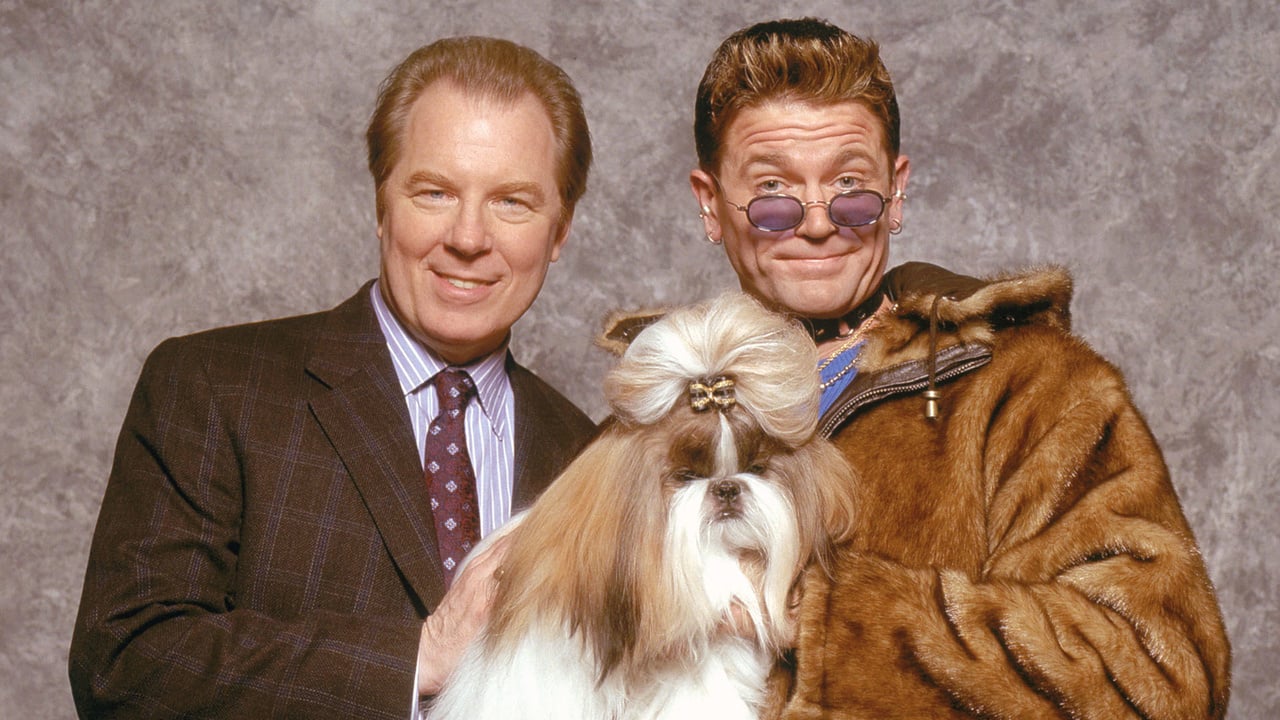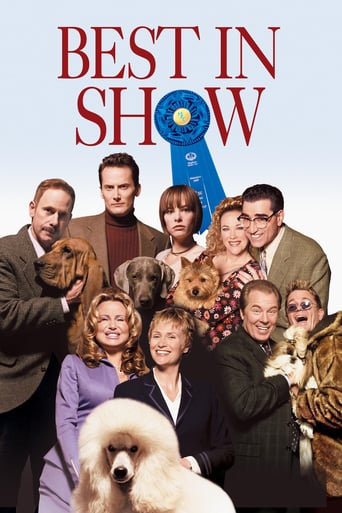BootDigest
Such a frustrating disappointment
Holstra
Boring, long, and too preachy.
Beystiman
It's fun, it's light, [but] it has a hard time when its tries to get heavy.
Dirtylogy
It's funny, it's tense, it features two great performances from two actors and the director expertly creates a web of odd tension where you actually don't know what is happening for the majority of the run time.
aquascape
"Best in Show" doesn't only call out for dog lovers, but for all people alike, as the main focus is a dog show competition, but Christopher Guest handcrafted it into a multilayer satire about how people can go to extreme lengths to win first prize.The variety of personalities combined with the traditional cast composed of Guest's regular actors made the character development grow almost on its own.While "Best in Show" will not surpass Guest's earlier films or be in a select top of satire films, it's still a decent mock on the behavior of people in a competition.
sharky_55
Christopher Guest could point his camera at almost any group and find absurdity within their ranks. In 1984 he was the lead for the rock band Spinal Tap, who though they were leagues better than they actually sounded. In his self-directed Waiting for Guffman, he turned to a group of delusional, small-town hicks who compared themselves to the Kennedys and had aspirations for Broadway. And here he focuses on a niche group that seems so perfectly ripe for comedy it is a wonder that no one has noticed them before. Anyone who has owned a dog will know that we all get a little weird around them. We adopt a baby-style talk, and address them as if they could understand our every word. The owners who enter their darlings into dog shows take this behaviour a step further, with some hilarious results. The film, like Spinal Tap and Guffman, is shot in the mockumentary style, with text on the bottom of the screen to introduce us to our peculiar cast, and a faux-haphazard camera that follows behind their every step. Guest is good enough not to simply let the script dictate the laughs - the first scene is a serious therapy session between two couples, talking about the supposed trauma of one of their kids, and only after holding the tension for as long he can does Guest pan over to the bored-looking Weimaraner in the third chair. The swivel is slow and incredulous, mimicking the audience's own disbelief and effectively pulling off the bait and switch. Later when the Flecks joke about Gerry's lack of coordination, they camera just ever so slightly drifts downwards to reveal his two left feet. It's the sort of joke that is dumb and obvious once you've seen it, but through the format Guest forces laughs out of us that have no business being there, by creating a persona behind the camera that is continually exasperated and shaking its head. The intimacy of the talking head is a huge asset here, because all of the characters are inherently stereotypes. In a conventional film it would be funny enough to observe them from a distance, with all their actions and dialogue pre-planned, but it would eventually be a bit tiring. Guest's format seemingly allows them a chance to defend their reputation, and thus he creates more humour by instead making their attempts collapse into themselves. There is Jennifer Coolidge in her usual blonde bimbo role, as the trophy wife of a near catatonic sugar daddy who can barely even pretend to have similar interests as her husband outside of soup, the outdoors, frozen peas and talking. The Swans are upper-class yuppies, so of course they met in a Starbucks, but they reveal it was actually two different stores across the street from each other (they of course live in a neighbourhood where this is the norm) and are not the slightest bit aware of the ridiculousness of this little detail. One half of the gay couple has already packed six kimonos for a two day trip, so when his partner protests, he realises he may need a few more. And there is Guest himself, lovingly showing off his ventriloquy dummy like a kid on show and tell day. Best in Show never descends into mean-spirited territory because beyond the gags, we recognise that these character's eccentricities are ultimately channeled through a love for their dogs, however unresponsive the dogs themselves may actually be. When the Swans enter the airport, they push their trolley of luggage along, but they also drag Beatrice's dog crate, which is larger than all their own belongings combined. Later when Meg is desperately trying to find a replacement stripy, squeaky bee toy for her, every attempt of logic on the shop owner's part flies hopelessly past her. They have their own crazed logic; Meg shouts at her husband that Beatrice is not listening to him, not because she is a dog, but because she is freaking out about her lost toy, all while the camera focuses once again on her bored face. The Flecks are likewise obsessed. They sing duets about Terriers with harmonies so bad they end on completely different keys, and their reaction to their baby being held hostage up on a shed roof is as if the world is ending. Eugene Levy has the natural ability to be flustered before it is even appropriate; he starts a sentence, talking about the weather on the drive-up, and has not thought on how to end it (A little cloudy coming up through West Virginia. But once we get into Pennsylvania...it's still, uh, still overcast."). And of course their card is overdrawn - they are every bit the couple to spend more on their dog than themselves, and we chuckle and love them for it.
Red-Barracuda
This is Spinal Tap (1984) is in my humble opinion perhaps the greatest comedy film ever made. By making it so good, its creators simply set the bar so high, no one else – themselves included – have subsequently ever been capable of reaching its heights ever again. So it's not really much of a criticism in pointing out that Best in Show is not as good as Spinal Tap. It is a satire on the kind of people who participate in championship dog breeding. The events revolve around a gathering called the Mayflower Kennel Club Dog Show. There isn't really too much of a plot-line here, it's very much a character-driven comedy. It works because the actors in the ensemble cast are all adept at improvised comedy, so it's a film full of little moments rather than a major story arc.Spinal Tap's Christopher Guest directs as well as acts in this one. He certainly has a feel for the mockumentary genre and has contributed to many of the best ones out there. I would probably describe Best in Show as amusing rather than hilarious though. There are a few laugh-out-loud funny moments though, such as the scene revealing the man with two left feet; while virtually every line uttered by the TV commentator played by the excellent Fred Willard is comedy gold. Truthfully, mixed in with the best material are some more strained jokes. However, as a whole, it works pretty well and the talented cast elevate the material when it falters on occasion. All-in-all, a solidly enjoyable movie.
Jacob Rosen
There are plenty of laugh-out-loud moments, but it's the finely observed character studies that make this gentle mockumentary by Christopher Guest so enjoyable. Guest, along with co-writer Eugene Levy, populates the world of dog shows with identifiable people and while they often draw caricatures (particularly a married couple, played by Michael Hitchcock and Parker Posey, who project their fears, hostilities and parenting efforts upon their Weimariner; and Michael McKean and John Michael Higgins as an over-the-top gay couple), the ensemble has such affection for the characters you're happy to accept them for who they are. This is because the improvisational aspect of the dialog makes everyone seem real; you feel as if you know and sympathize with them as they struggle to succeed, as in the case of Levy and the sublime Catherine O'Hara, playing a couple who find they can't afford a hotel room and are put up in a utility closet by the well-meaning hotel manager (wonderfully played by Ed Begley, Jr.). Even those meant to be identified as "villians" (dog handler Jane Lynch and owner Jennifer Coolidge) understand their characters so well it's impossible not to like them. The film is immensely entertaining and seems to fly by, so much so that it belies its reasonable ninety minute run time.

